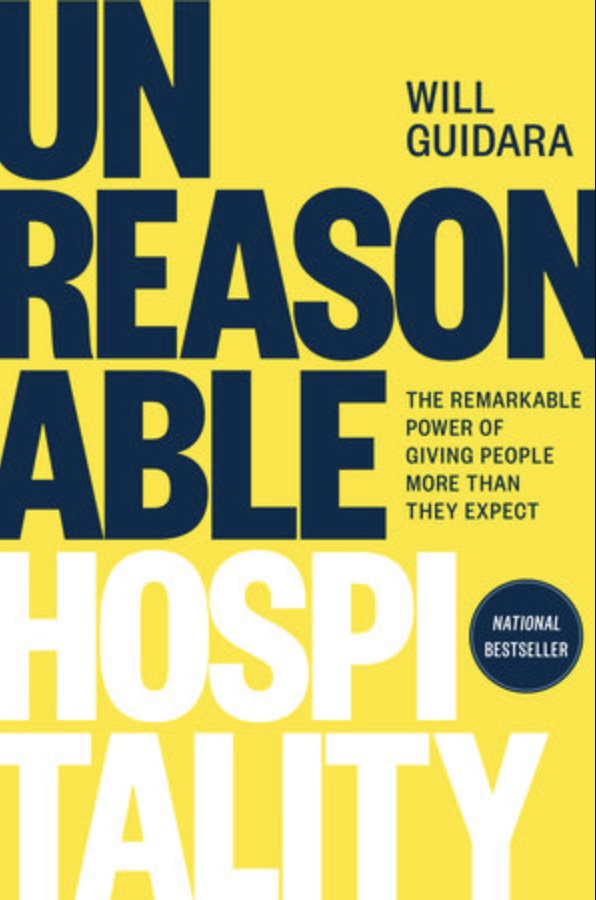Key Quote:
“Most of the chefs on the 50 Best list had made their impact by focusing on innovation, on what needed to change. But as I thought about the impact I wanted to make, I focused on the one thing that wouldn’t. Fads fade and cycle, but the human desire to be taken care of never goes away.” (p 4) “Hospitality is a selfish pleasure. It feels great to make other people feel good.” (p 7)
Key Points and Concepts
Chapter 3: The Extraordinary Power of Intention
Guidara uses the backdrop of his first several jobs, from scooping ice-cream at Baskin-Robbins to bussing tables at Wolfgang Puck’s, to showcase the principle of being intentional with your actions. He sets the stage for the specific recommendations and lessons he shares in later chapters by orienting his reader around intentionality. (p 24)
Followers of Admired Leadership behaviors will appreciate this approach. For Guidara intentionality is his siren song in the same way that leaders should accept the obligation of leadership. In this way, a person accepts the obligation to accept the behaviors of excellence no matter what position they find themselves in. A dishwasher is still a leader and an innovator, so be intentional, even before you have the title or position of power.
Chapter 4: Lessons in Enlightened Hospitality
Language Creates Culture
Guidara’s key insight in this chapter is that hospitality focused on customers must emanate from an organizational culture. He demonstrates this by way of crediting Danny Meyer’s routines for running his own teams in cultures. The main lesson he highlights is in the way that language is used to create culture. What is said, how it is said, and how those words are lived are important concepts for any cultures and often take on a unique life of their own. (p 29)
Danny Meyer’s teams and organization seemed to be accused of being cults. That word might be used to carry a snide criticism, but both Guidara and Meyer seem to embrace the moniker in a healthy way. (p 31)
Chapter 5: Restaurant-Smart vs Corporate-Smart
Guidara relays a familiar story of being cut off at the knees after making a decision as a middle manager. This is an all too familiar tale that anyone who has served in middle management can tell. “If you take care of your managers and give them what they need to be successful, you put them in a better position to take care of their teams.” This quote shows up in a very specific example that shows the conflict between corporate intelligence and wisdom that comes in the trenches of any organization. (p 43)
Chapter 7: Setting Expectations (p 57)
“Some of the best advice I ever got about starting in a new organization is: Don’t cannonball. Ease into the pool.”
Guidara again uses his growing depth of experience as behavioral example for any leader who is stepping into a new organization. He paints the picture that leaders will have a balance to strike. One of the hardest parts about being dropped into a new environment is that everyone is telling slightly different story, each with their own bias and potentially loaded agenda. As a result, you won’t agree with everything you’ll hear, but this moment won’t be the time to disagree. You have to start by listening.
Guidara paints the picture of the cultural miscommunication that was rife at EMP when he first landed. His story of taking a few weeks just to
listen is one that any leader should heed when stepping into a new organization.
Several very behavioral recommendations are nestled into this chapter that are worth highlighting. One in particular is the way Guidara discusses carrying criticism. “Criticize the behavior, not the person. Praise in public, criticize in public. Praise with emotion criticize without emotion.” (p 68). His reference in writing “we were as thoughtful about criticism as we were about praise” is fleeting and is easy to miss as a behavioral gem as it is an easy concept to understand but difficult and more rare to establish as an important routine.
Chapter 8: Breaking Rules and Building a Team
Continuing to weave a narrative the builds towards an explanation of how EMP became successful in earning the many accolades it eventually did, Guidara discusses the importance of hiring slow and intentionally. “You need to be as unreasonable in how you build your team as you are in how you build your product or experience.”
The author knows what it is like to think “We need someone so desperately to fill this role – how bad can this person be if we just quickly fill the spot?” It is in fact more detrimental to saddle yourself with the wrong person. Your team will suffer the damage and end up back where you started.
An infectious note about the authors time in college makes an appearance that really makes connecting with the author through this story especially easy. Guidara tells about a friend in school who connected with him on a level “made it cool to care.” Often high-performing individuals won’t know how they are different from everyone else until they find other high-performers. Just being in community
with other people who care and care enough to try hard is the best motivation a group of A-players needs. (p 86)
Chapter 12: Relationships Are Simple. Simple is Hard
Create Your Own Traditions
An important note in the story to highlight was Guidara’s choice to allow EMP to break with company culture in a way that seemed anathema to the existing culture. Corporate culture implied for all the restaurant managers that they would not be open on any of the major holidays. Taking the time to read through this story highlights several different behaviors that can be incorporated into a leader’s routines. (p 142)
“No aspect of your business should be off-limits to reevaluation.” This was very apparent in the example of choosing to keep the restaurant open on Thanksgiving Day for the first time in 2007.
Conclusion
Unreasonable Hospitality reads much like the practical voice of Admired Leadership’s daily newsletter, Field Notes. It clearly seeks to deliver practical and tactical lessons that can be used by leaders in any discipline. It is an added bonus for those who are looking for lessons to glean specifically for the hospitality industry. The lessons are too numerous to list in a single summary, yet punctuate the narrative of the team at EMP achieving their success in a way that is memorable and inspirational.
Guidara, W. (2022). Unreasonable Hospitality: The Remarkable Power of Giving People More Than They Expect. Optimism Press | Penguin Random House.

When your own information is unclear, rely on social learning. However, too heavy a reliance can lead to group-think in an echo chamber with everyone thinking they came to the idea independently and thus are more confident about the idea.
Guidara uses the backdrop of his first several jobs, from scooping ice-cream at Baskin-Robbins to bussing tables at Wolfgang Puck’s, to showcase the principle of being intentional with your actions. He sets the stage for the specific recommendations and lessons he shares in later chapters by orienting his reader around intentionality.
An important note in the story to highlight was Guidara’s choice to allow EMP to break with company culture in a way that seemed anathema to the existing culture. Corporate culture implied for all the restaurant managers that they would not be open on any of the major holidays. Taking the time to read through this story highlights several different behaviors that can be incorporated into a leader’s routines.
